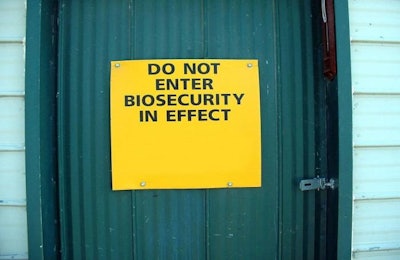
North American poultry producers – and in particular those in California -- have learned more than once that a devastating disease outbreak can wipe out an entire flock.
In 2014-2015, the poultry industry experienced widespread losses in the United States and Canada because of avian influenza. In more recent months, another deadly poultry disease outbreak has been concerning poultry producers, especially in California. Since May 2018, an outbreak of virulent Newcastle disease (vND) that started in backyard exhibition chickens has plagued the state and even infected several commercial layer operations. With the exception of one bird that was moved to Utah from California, all cases have been contained to California.
While eradicating either disease is difficult, good biosecurity measures played a key role in preventing another major avian influenza outbreak from occurring, and it has likely helped slow the spread of vND.
Extra biosecurity paying off
Annette Jones DVM, California’s state veterinarian since 2010, has had first-hand experience in combatting both avian influenza and Newcastle disease, and in 2016 was honored with the USDA Animal and Plant Health Inspection Service (APHIS) Administrator’s Award for her efforts in battling both diseases.
Some of the first avian influenza cases in the United States during the 2014-2015 outbreak occurred in California’s Stanislaus, Merced and Kings counties, and now she is leading the effort to control the spread of vND.
The current vND cases are further south than any of the avian flu cases of the past, and Jones told Egg Industry the poultry producers of Southern California currently maintain biosecurity standards well above what is required through the National Poultry Improvement Plan (NPIP).
“Since May 2018, every commercial poultry company in Southern California has implemented some for of enhanced biosecurity, and almost all companies have been submitting regular vND samples to the California Animal Health and Food Safety laboratory, using their own labor but under state oversight,” Jones said. “In fact, this proactive surveillance is what led to the immediate detection last December of the first spillover into commercial poultry. Disease was detected in a pullet flock even before they started experiencing increased mortality.”
Jones added that some operations that have been following all of the recommended tenets of biosecurity have made investments to further enhance biosecurity, including the addition of fences, security cameras, locking gates, concrete aprons, truck washes, employee parking areas and changing stations.


















